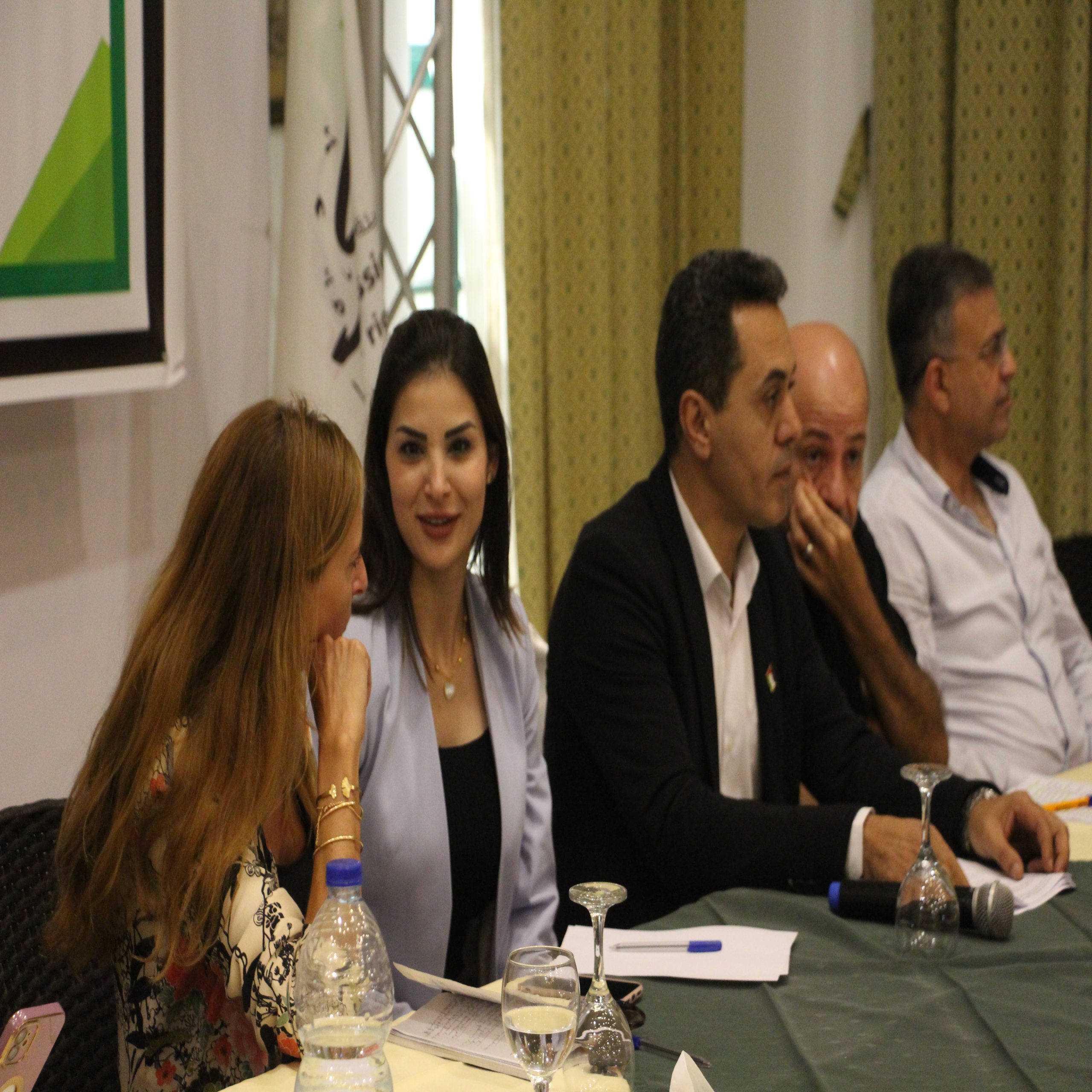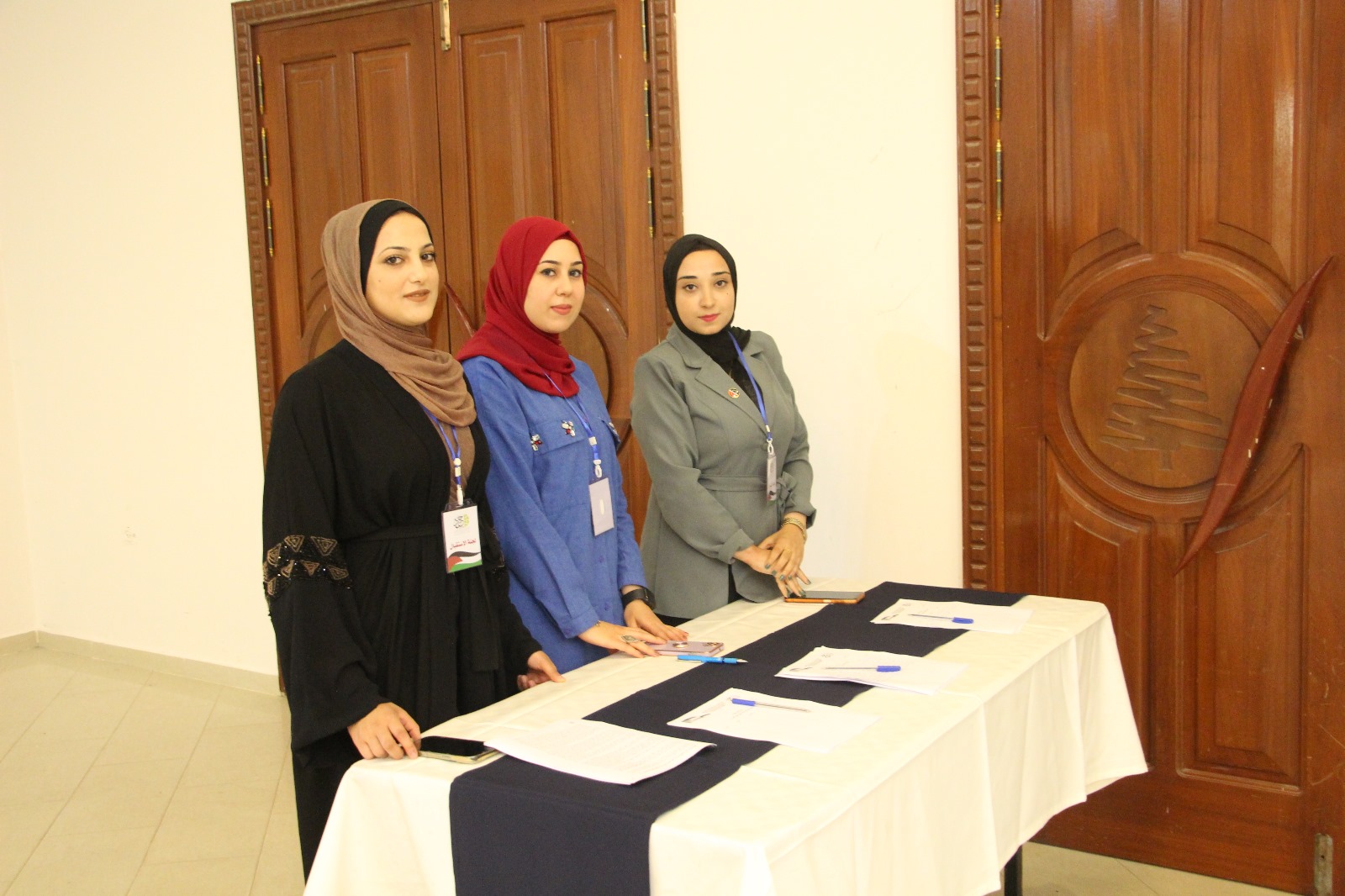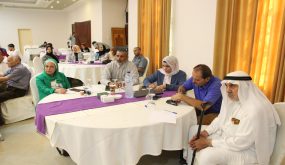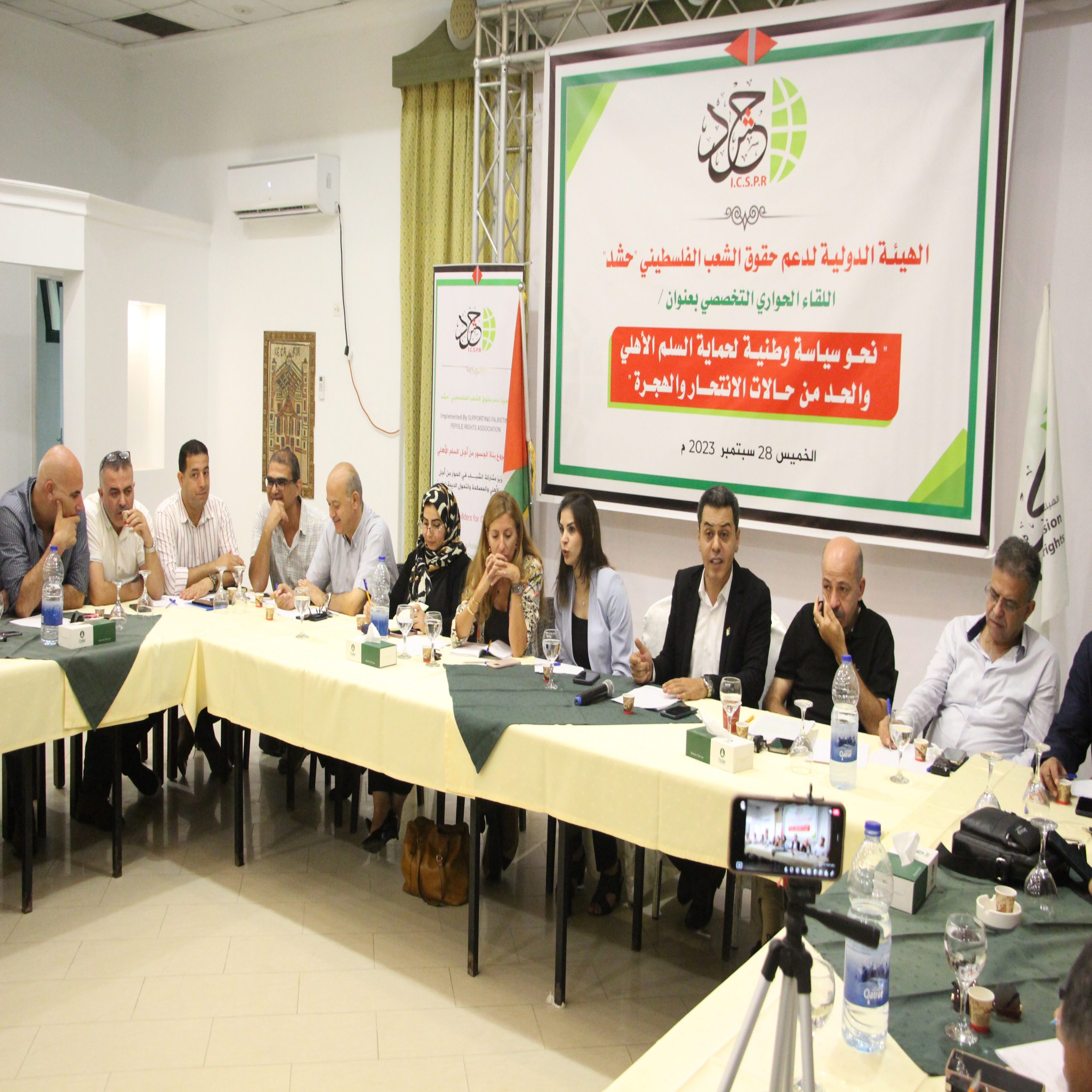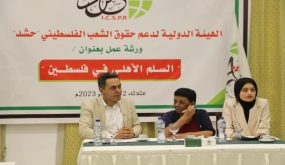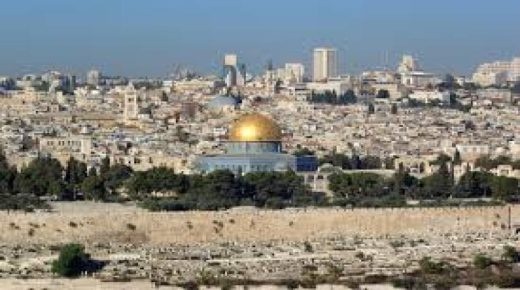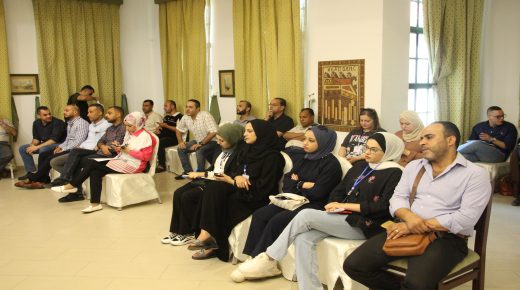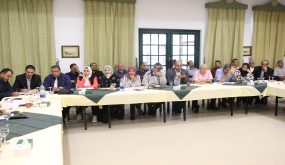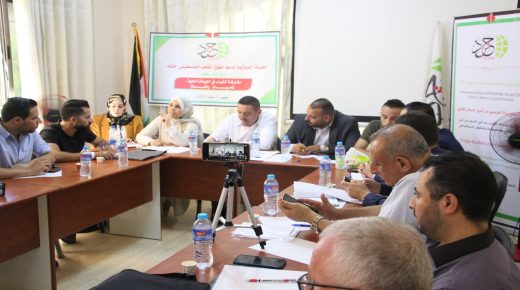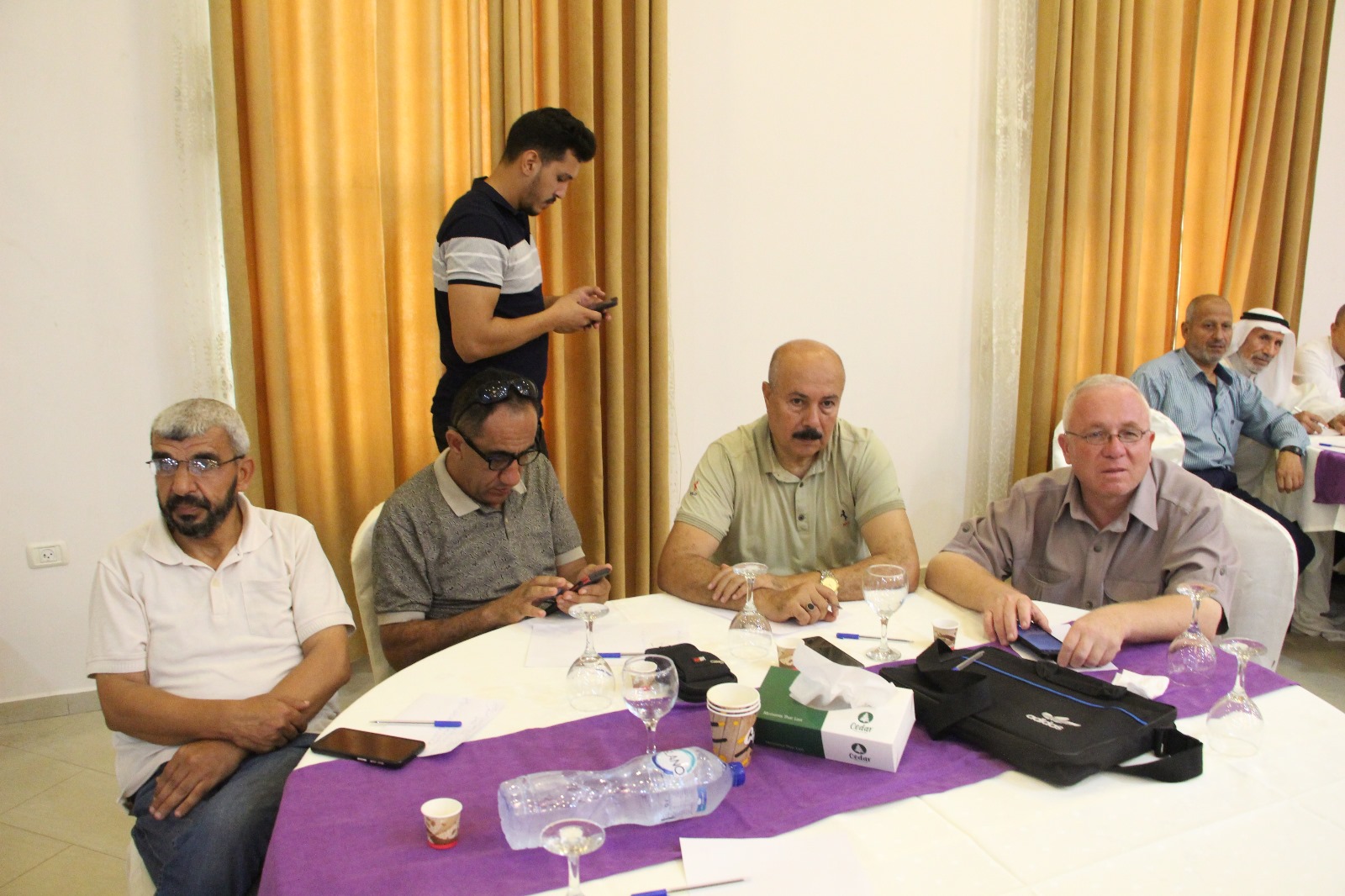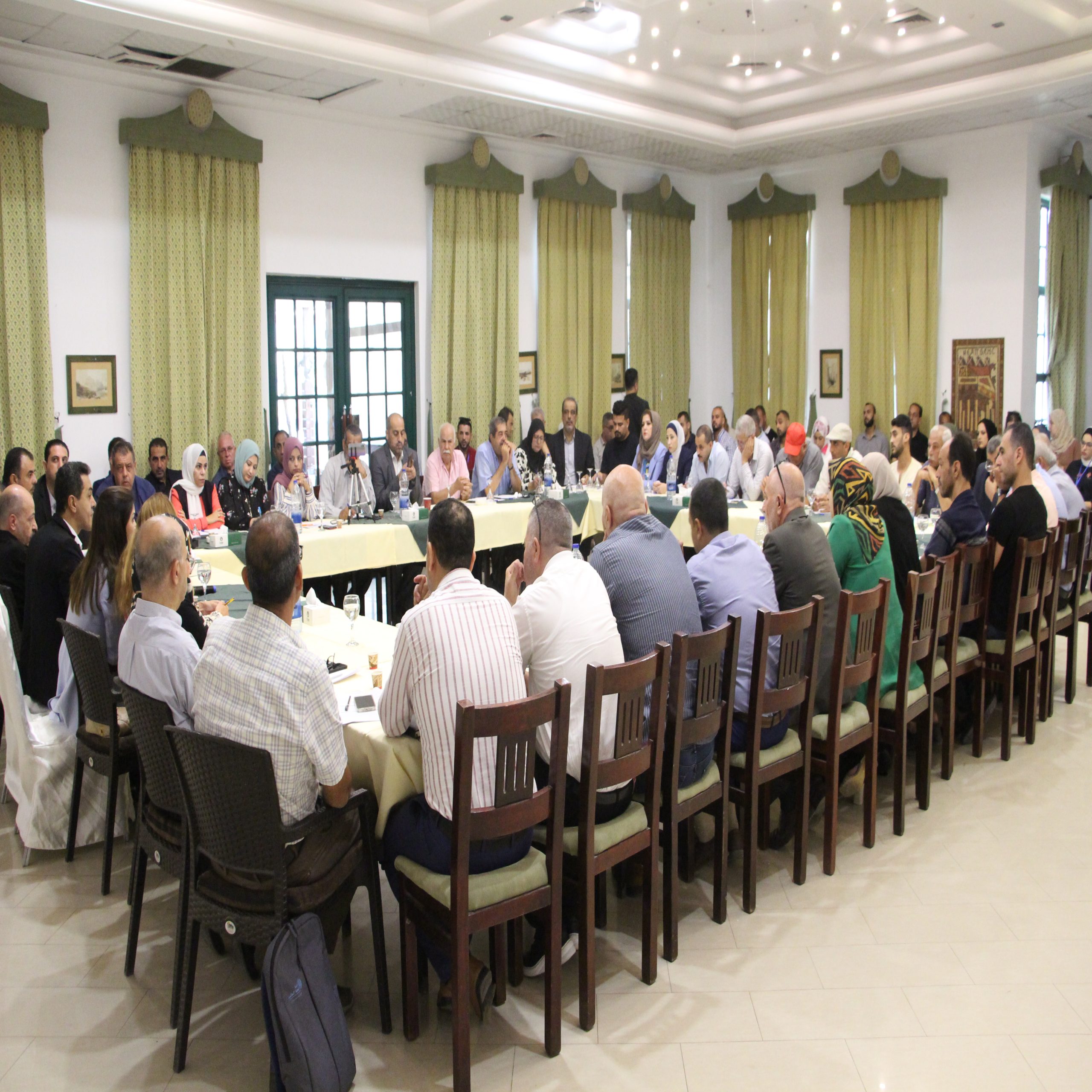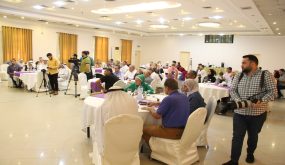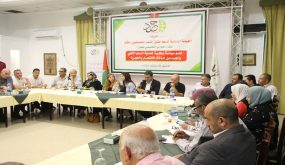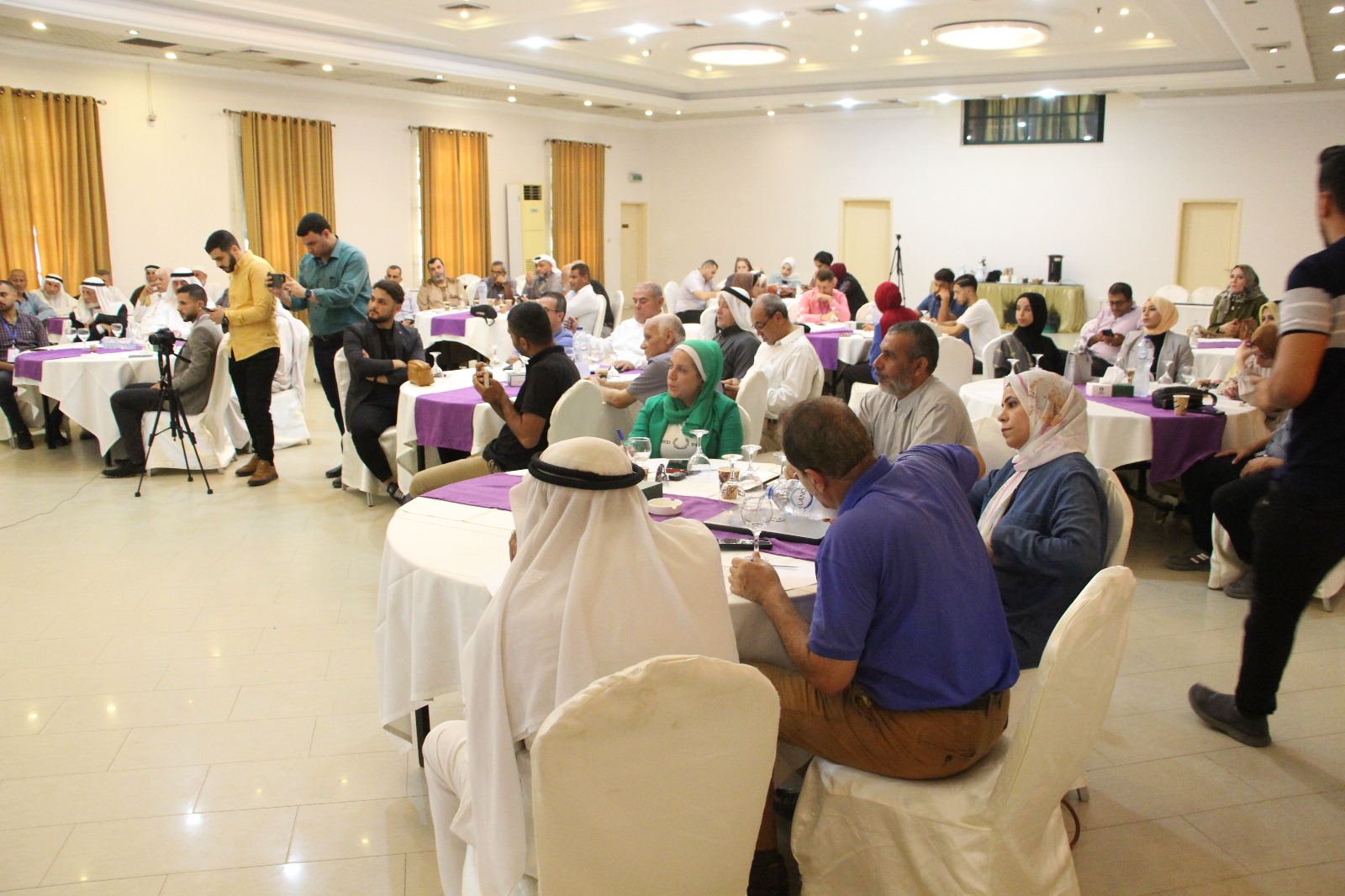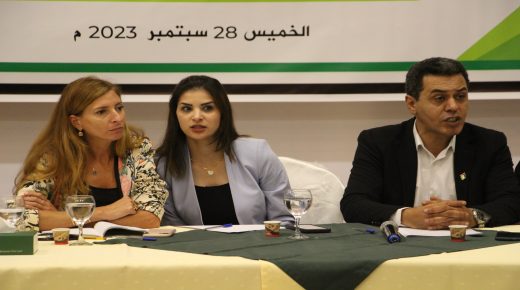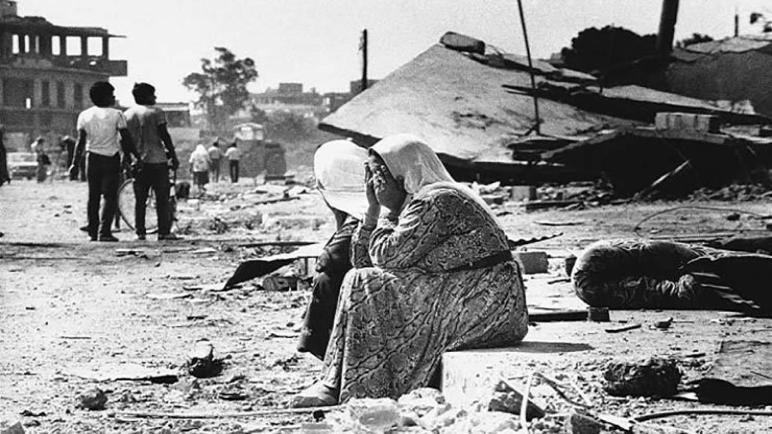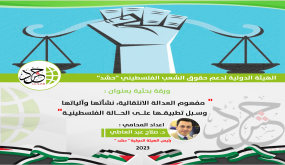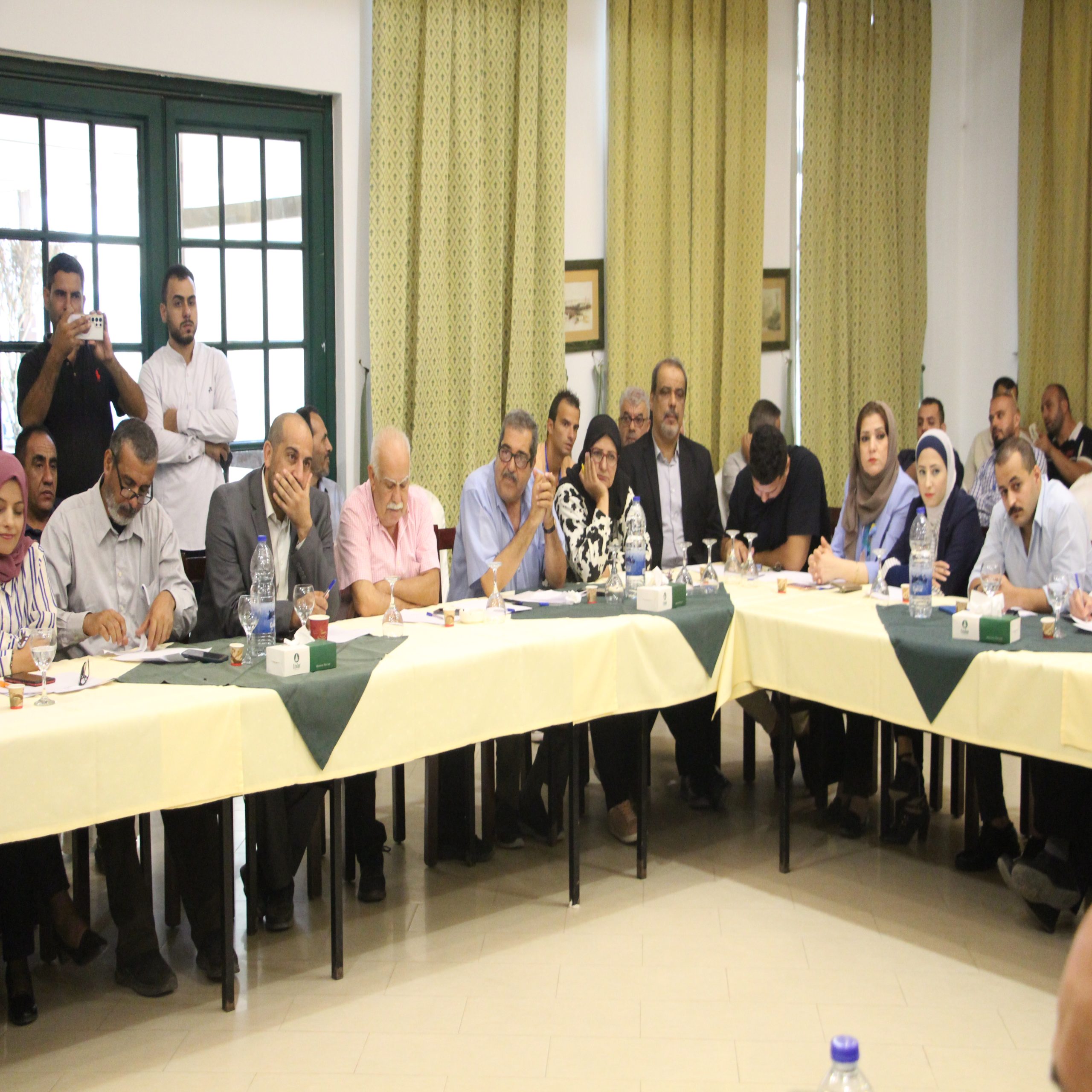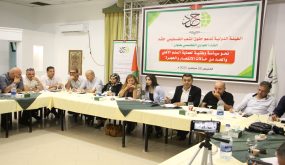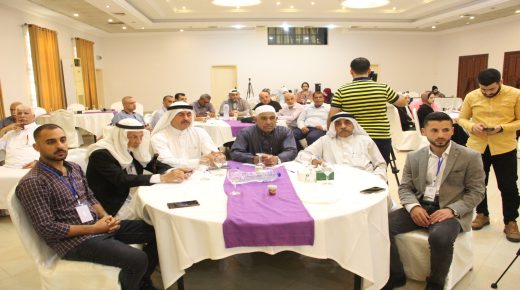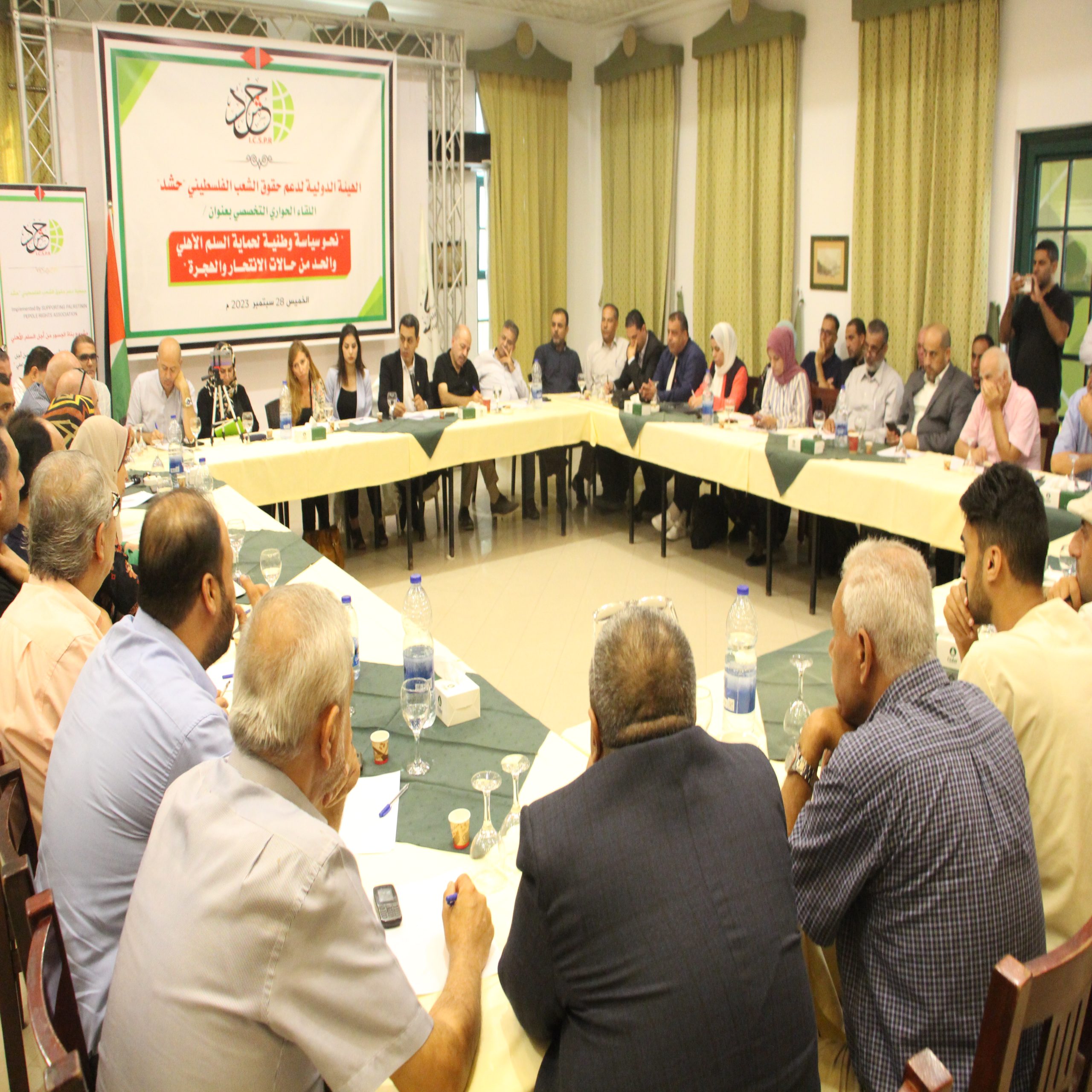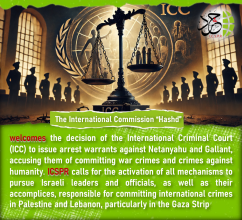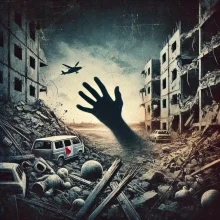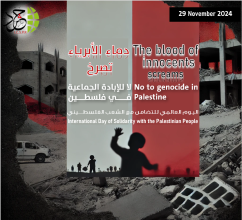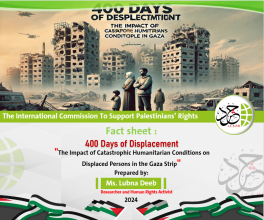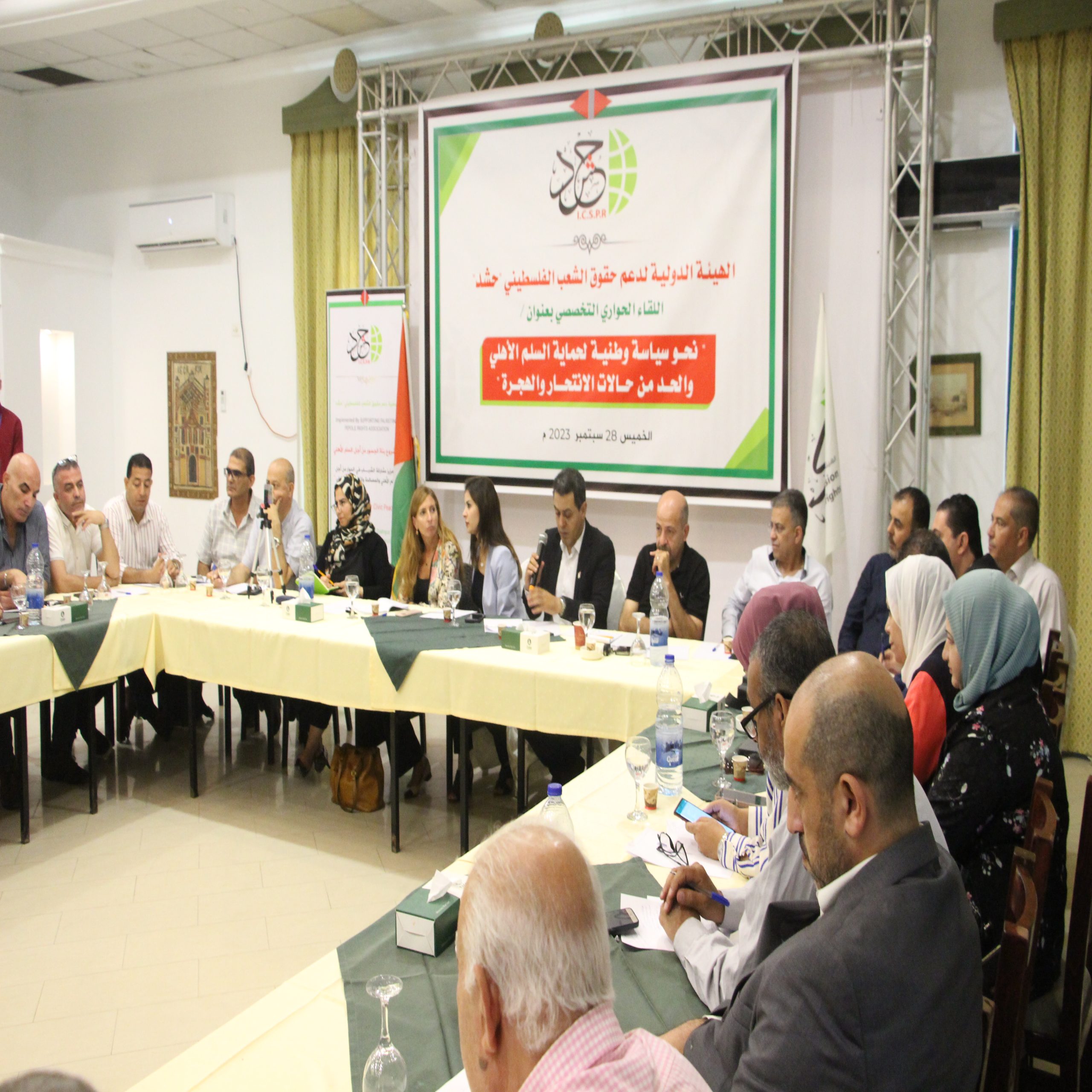
Specialists develop solutions that aim to safeguard civil peace and decrease suicide and migration in Gaza
Number: 98/2023
Date: September 28, 2023
Native language: Arabic
Press release
During a Specialized dialogue session organized by Hashd.
Specialists develop solutions that aim to safeguard civil peace and decrease suicide and migration in Gaza.
Today, September 28, 2023, The International Commission to Support Palestinian Rights (Hashd) hosted a specialized dialogue meeting with representatives from governmental and private institutions, political forces, and youth, titled “Towards a national policy to protect civil peace and reduce cases of suicide and migration in the Gaza Strip.”
Dr. Salah Abd El Atie, head of The International Commission to Support Palestinian Rights “Hashd,” welcomed the attendees, emphasizing that the meeting’s goal is to foster hope through collective action and partnership to protect civil peace and human security, as well as reduce cases of migration, suicide, and other social phenomena.
He stated that, in the face of the external challenges represented by the occupation, the blockage in the prospects for reconciliation, and the continuation of internal challenges, he noted that, despite the humanitarian and national miracle that Gaza presented with its steadfastness and patience, despite all of Israel’s aggression and siege and its repercussions, and despite the state of division and the deepening of crises in the sector due to collective punishments, he stated that In the Gaza Strip, taxes and collections are all images of poor immunity and weak markers of human life, but the most hazardous thing is when we lack a vision, a national policy, and a sense of direction, or collective action based on partnership between all national and social components.
According to Abd El Atie, the various policies went for crisis management and thinking from within the old fund, which made the poor classes bear the majority of the economic burdens, and the measures taken were not consistent with the demands of the majority of citizens, as the feeling of absence of justice exists, as well as the feeling that fuels the culture of division.
In light of the current scenario, he stressed the importance of developing ideas and solutions to maintain civic peace and minimize the phenomena of suicide and migration, whether in the short, medium, or long term.
The Swiss representative, Jasmine Hester, expressed her delight at being able to establish a partnership with The International Commission “Hashd,” as this Organization aims to increase youth participation, and this workshop is not the first to be held for this purpose, appreciating everyone’s attendance and ensuring that it will be a successful and enjoyable meeting and event.
Dr. Muhammad Abdel Hadi Nassar, Director of the Ministry of Social Development’s Department of Studies and Statistics, stated that the Ministry of Social Development submitted a proposal to establish a national council to reduce suicide, bringing together government ministries and relevant institutions, pointing out that the Gaza Strip is economically limited, and thus it is necessary to seek legitimate policies in light of this reality.
According to Dr. Jamil Salman, Director of Mental Health in the Gaza Strip, Suicide and immigration, are not occurrences in the Gaza Strip. However, they must give this issue the right scale without media exaggeration so that we do not contribute to its growth, while also recognizing that it is a problem that demands all measures to prevent it from happening in this case.
Dr. Samir Abu Mudallala, a member of the Democratic Front’s Central Committee, discussed ways in which to fight suicide and immigration, noting that it is necessary to support the private sector in hiring graduates, which necessitates developing economic policies, improving wages, and adhering to the minimum wage, and providing grants and loans to establish small projects for young people, with an emphasis on research. For new expertise that will allow them to pursue new work options.
Brigadier General Raed Al-Amoudi, Brigadier General in the Palestinian Police Forces, mentioned that we are now facing a real problem represented by mobile phones and family disintegration and that it is necessary to intensify efforts to find solutions and protect our children from falling, emphasizing the importance of the family in protecting our children from falling victim to the suicide and migration phenomenon.
Mr. Adnan Abu Hasna, spokesman for the United Nations Relief and Works Agency for Palestine Refugees (UNRWA), stated that all solutions in the Gaza Strip are patchwork and partial, and cannot solve all of the crises that the Strip faces as a result of the siege, indicating that UNRWA has made a decision and that it should be informed. He emphasized the importance of changing the education system in the Gaza Strip so that it shifts away from the humanities and toward technical and applied sciences, as well as encouraging new specializations such as distance work programs, as one of his priorities.
Mr. Ayman Abu Karim, Director General of Employment and International Relations at the Ministry of Labor, cited the Israeli siege, the consequences of the aggression, the weakness of the private sector, and a lack of funding, as well as the state of division, highlighting the Ministry of Labor’s role in alleviating the unemployment situation through employment projects. Temporary work, organizing the labor market, attempting to find alternatives, and supporting youth development projects through interest-free loans, emphasizing the dangers of illegal immigration and its ramifications for Palestinian society, of which youth must be made aware.
Dr. Suheir Khader, a member of the Popular Front for the Liberation of Palestine’s General Central Committee, presented several solutions to the problems of suicide and immigration, including the need for international institutions to intervene to end the division, turn to technical and vocational education, and establish a fund for youth care and support. He launched practical programs, citing a direct link between the rise in suicides, migration, and the bad economic and social situations that young people confront.
Dr. Fawaz Al-Sousi, a representative of the Ministry of Youth and Culture, reaffirmed, “We have been living in a state of siege since the signing of the Oslo Accords, and the one who bears responsibility is the Israeli occupation, which has imposed a siege on the Gaza Strip for years,” highlighting the fact that the problem of immigration in the Gaza Strip is brought on by my means of subsistence.
Mr. Yacoub Al-Ghandour, representative of the Ministry of Economy, emphasized the need for the Palestinian Authority to play a role in creating job opportunities for Palestinian youth by concluding agreements between Arab countries rather than European countries to solve the problem of illegal immigration, and this is a matter of responsibility, supporting the Palestinian people, and confronting the entity.
Mr. Sharif Al-Nayrab, Director of Media at the National Committee for Partnership and Development, urged the European Union to work with us to demand the rights of the Palestinian people in the Gaza Strip, as well as to investigate the practices carried out by the Palestinian Authority in the Gaza Strip, which lead to a trend of suicide and immigration, holding the Israeli occupation fully responsible for what the People of Palestine are experiencing.
According to Mr. Mustafa Al-Sawaf, a writer and political analyst, it is essential to open the door to work overseas as an entrance point to find a solution to minimize suicides and immigration since we have a human output that surpasses the sector’s demands.
While Dr. Sabah Abu Samhadana, an expert in psychological counseling, affirmed that vocational training is critical for opening horizons for Palestinian youth to lessen the problem of immigration and suicide, he also contributes significantly to providing them with work options.
Mr. Musab Al-Braim, the Islamic Jihad Movement’s media spokesman, believes that the primary threat of immigration is that it transforms from a forced choice represented by the absence of an economic horizon into a goal and desire for Palestinian youth. As a result, a lobby must be developed to exert pressure on decision-makers, and the youth must be there to lead the way. With the necessity of continuing the awareness role, as well as the value and function of research and study centers in treating issues, we must also strive to generate pressure to alter the attitude that works in charity organizations that fight poverty based on poverty management.
Mr. Khalil Abu Shamala, a human rights activist and political writer, made it clear that our issue is political, and we are the ones who have turned it into a humanitarian issue, pointing out the importance of not waiting to solve the Gaza Strip’s problems so that suicide does not become an everyday occurrence, and that these meetings will not result in solutions.
Dr. Walid Al-Qudwa, Secretary-General of the Palestinian Rally for Justice and Development, indicated that we must look for solutions rather than reasons that our main problem is with decision-makers, who are part of the problem, and that the immigration project is reconciled with the Zionist project, which aims to depopulate Palestinian lands of young people.
Dr. Jihad Malka, a politician and political science specialist, advocated for the removal of government and municipal taxes, the funding of youth programs, and a reduction of punitive measures imposed by the Palestinian Authority on the Gaza Strip.
Dr. Nabil Abu Muileq, a legal specialist, urged the international community to grant significant loans with low administrative costs to the Gaza Strip’s private sector to minimize unemployment and employ as many young people as possible.
In response, journalist Muhammad Yassin emphasized the importance of assessing Palestinian national discourse, avoiding negativity and hate speech, and ensuring balance in media discourse. There must also be a good evaluation of the difficulties so that effective treatment may be delivered, and the gravity of justifying suicide must be recognized.
Dr. Iyad Rabaa, a political and social affairs specialist, said, “Pressure must be put on decision-makers to work on holding general elections with all of its components.” Every individual has the freedom to select what is most acceptable for him, and the people have the right to conduct democratic life to choose someone to represent them according to the program they think proper.”
Dr. Khetam Odeh, a specialist in psychological sociology, stated that thinking about immigration is a form of mass suicide, noting that the main reason for suicide is to escape the difficult economic reality that the suicidal person lives in and that whoever attempts suicide requires rehabilitation, as well as the importance of establishing centers for suicide attempts.
Dr. Muhammad Abu Saada, a human security specialist, mentioned that it is necessary to change the education and accreditation system and move toward technical, vocational, and qualitative education, as well as specializations that are compatible with technological development, and that the leadership must work to solve these crises.
Ms. Huda Alyan, a member of the Feda Party’s Central Committee, stated that we need an integrated national plan, at the top of which is the establishment of a youth fund, and that its work be integrated, and in which the National Authority, the Authority in Gaza, the European Union, and the Relief Agency participate in confronting these phenomena that plague the youth. Institutions must focus their efforts not just on women and children, but also on young People.
Dr. Jassim Hamid, a university lecturer, explained that the two governments in the West Bank and Gaza Strip, as well as political parties, are primarily responsible for the spread of migration and suicide, emphasizing the importance of a serious and clear political will to end Palestinian division and complete the reconciliation file.
Ms. Islam Abu Muailiq, coordinator of the National Conference in Gaza, emphasized the importance of going immediately to reconstruct the political system, help the economic sector, safeguard all components of society, and support the Palestinian citizen’s resilience for him to remain in his country.
While Dr. Hikmat Al-Masry, a social and psychological specialist, emphasized the importance of institutions, the government, factions, and forces working together to create an educational awareness program for young people and develop an integrated strategy for the benefit of young people.
Ms. Rawan Al-Shawa, a member of the International Commission’s (Hashd) Board of Directors, stated that we need a firm national plan by the governments in Gaza and the West Bank, in collaboration with the Ministry of Labor and civil society institutions, to provide projects for young people and to intensify efforts to reduce the phenomena of suicide and immigration.
Dr. Lina Al-Zaanin, a member of the International Commission (Hashd) Board of Directors, explained that at a time when violations of the Israeli occupation are increasing, and in light of the deepening state of division, a serious approach to developing a national policy to protect civil peace and reduce cases of suicide and migration among young people in Palestine is required.
Lawyer Maitha Ahmed said that development programs, not merely relief projects, must be offered to young people in the Gaza Strip to assist and serve them in achieving sustainable development and reducing migration and suicide.
According to Unionist Mr. Jalal Arafat, it is necessary to develop a plan with government institutions and civil society to find a way out of the impasse by strengthening the Palestinian people’s steadfastness and empowering youth to prevent suicides and immigration that have emptied the nation of youth, who are considered the nation’s and its prosperity’s pillar.
The meeting summarized the importance of adopting a national policy to protect civil peace and reduce cases of suicide and migration, based on the demand for Israel to lift the siege on the Gaza Strip, as well as to increase solidarity and humanitarian response from international organizations and donor countries to support UNRWA, international and civil society organizations, and government agencies to ensure the continuation of providing services and strengthening the steadfastness and defend their rights.
The participants all agreed on the importance of ending the Palestinian division and holding comprehensive elections to ensure the rebuilding of the political system’s institutions on the foundations of partnership and democracy, as well as the presence of a government capable of dealing with national and humanitarian challenges.
They called for the neutralization of political conflict-related services, rights, and freedoms, the lifting of punitive measures imposed by the authority on the Gaza Strip, the reduction of taxes and collections by the government in Gaza, and the formation of a national partnership with the private, civil, and youth sectors aimed at strengthening political participation and developing procedures and measures at each of the following levels:
On the political level:
- The rehabilitation of the employment of Gaza Strip youth in public service in National Authority institutions.
- The Palestinian Authority will lift the restrictions placed on the Gaza Strip, including addressing the consequences, particularly for young people, in a way that ensures their enjoyment of humanity, so reducing the problem.
- The sector’s ruling body should reconsider illegal taxes, customs, and fees, and adopt economic policies that encourage young people to work on small and cooperative projects, such as encouraging easy lending with real benefits and emphasizing the importance of shortening the bureaucratic period in dealing with the stages of small projects.
- Allow for freedoms and rights, and put an end to police handling of young people’s demands for a decent livelihood in a way that fosters a sense of belonging and devotion to the motherland.
- Supporting the holding of local, student, and youth elections based on proportional representation and away from equivocation and equivocation policies, to increase youth participation in them in both word and deed, through candidacy and voting, based on active participation and involvement.
- Supporting young people’s wide involvement and participation in management processes, particularly in planning, organizing, implementing, and evaluating.
On the economic level:
- Adopting instructions to safeguard investors, offering tax breaks, and promoting, encouraging, and enabling investment in small and medium-sized industrial sectors.
- Creating a national fund to assist modest youth initiatives with set deadlines and resources.
- Increasing monitoring to put in place a minimum-wage system.
- Redirecting foreign funds to serve youth and their realities through coordinating interactions between civil society institutions and external donors in a way that gives financial donations to assist youth initiatives and activities, as well as directing and investing in Palestinian youth energy.
On the psychological and social levels:
- Investing in mental health and implementing a national strategy to reduce rates of violence, crime, addiction, migration, and suicide.
- Create a comprehensive national strategy to teach young people about the hazards of illegal immigration and suicide, including mosque sermons, seminars, and media publications, as well as promoting youth efforts in this area.
Finished.


